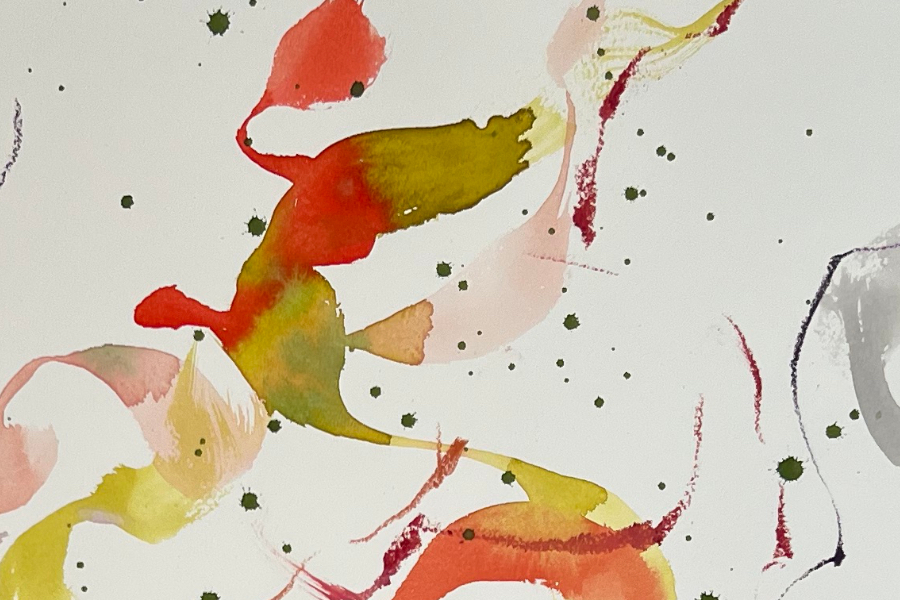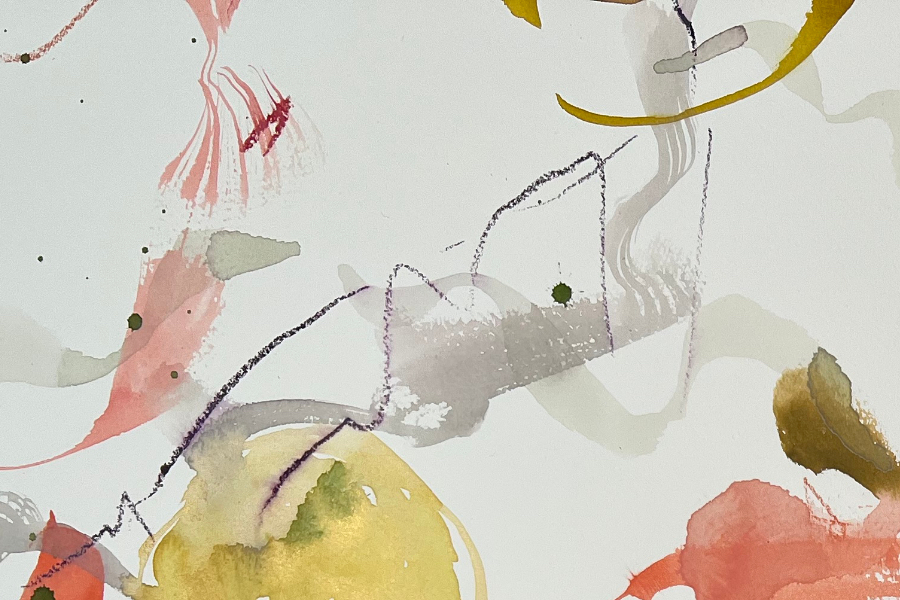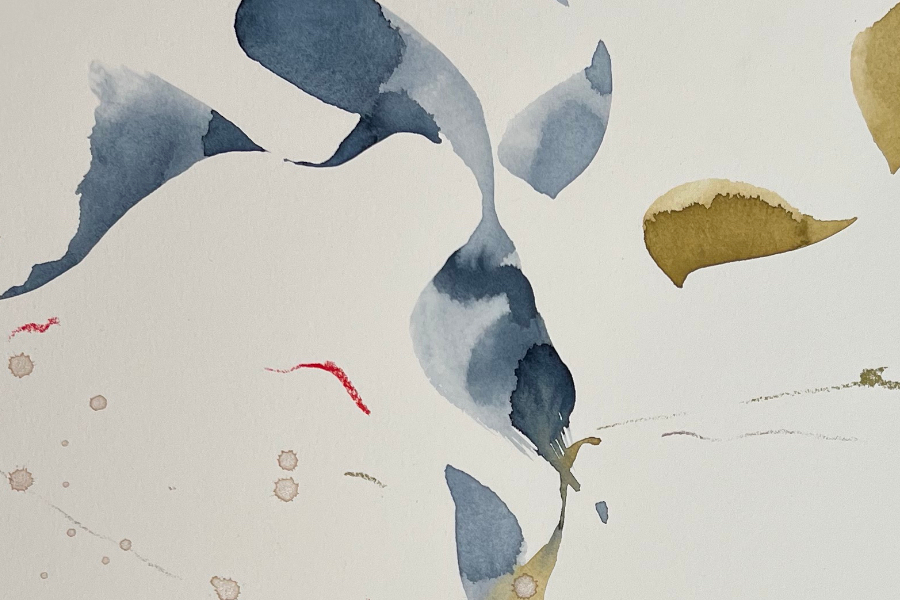I’m learning, each day, what it may mean to live.
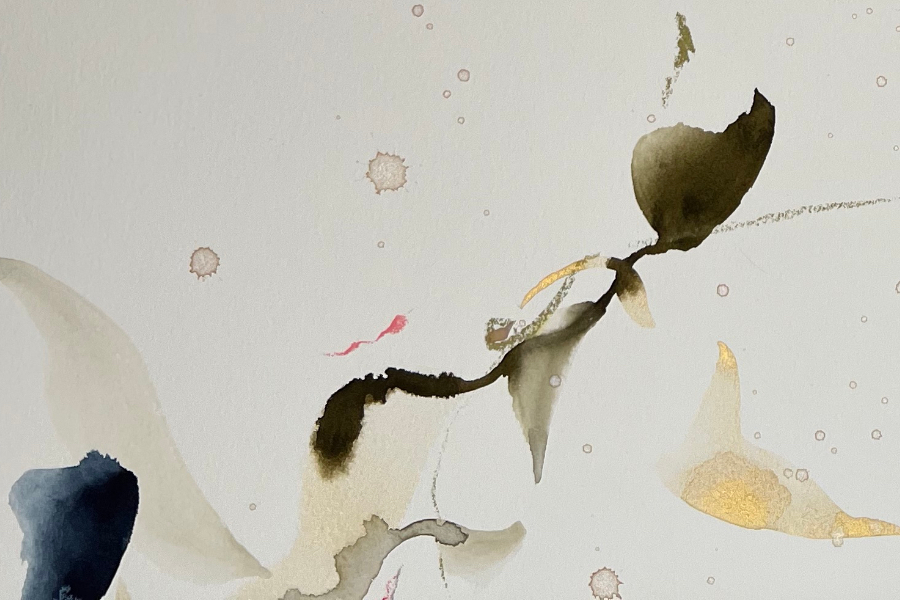
This piece is part of the 随筆 | Zuihitsu notebook, which features original art by Satsuki Shibuya.
Editor’s Note: The following piece includes mention of violence against women. Please take care while reading.
Motivated: A Zuihitsu
Two women in a field among unnamed trees battle, and only one would leave the field alive. As their swords clash in the sky, the autumn leaves swirl high above to meet them. The elder Flying Snow warns Moon that she would meet her end. Moon surges ahead as Flying Snow’s sword enters Moon’s side. One drop of blood drips from the edge of her blade and falls, touching ground, and a world of yellow leaves flurries to red. The universe hushes to a shade of scarlet, the hue of Flying Snow’s dress. I have repeated this scene from the Chinese film Hero many times since I first viewed it, imagining perhaps death could be this slow, this lyrical. Older now, I understand I know nothing at all about death, more importantly what it means to die as an Asian woman, though I’m learning, each day, what it may mean to live.
*
Journal Entry
January 16, 2022
Michelle Alyssa Go’s murderer was a homeless man named Martial Simon, sixty-one years old, who had a history of mental illness. Though the murder is not categorized as a hate crime, Asian Americans are outraged and afraid.
“Whether it was a hate crime or not, the reality is, Asian Americans, especially Asian American women, every time we see an incident like this, our anxiety goes up,” Sung Yeon Choimorrow, executive director of the National Asian Pacific American Women’s Forum, told NBC Asian America. “Regardless of what the correlation is, we see ourselves in these pictures.”
Kimmy Yam writes, “Experts previously told NBC Asian America that the term hate crime should be used only when a suspect is charged, as it has dangerous implications—particularly for communities of color—when applied to cases that do not involve racial animus.”
Martial shoved forty-year-old Michelle Alyssa Go from behind using both hands as a downtown R train was passing.
*
There was a candlelight vigil. There was a makeshift memorial with Post-it notes.
I sit at my computer, watching from afar. The lights on the hillside here gleam and each day the sky shows me its complicated face, from afar.
On @hellosami’s Twitter account, I see a photo. There are 420 likes.
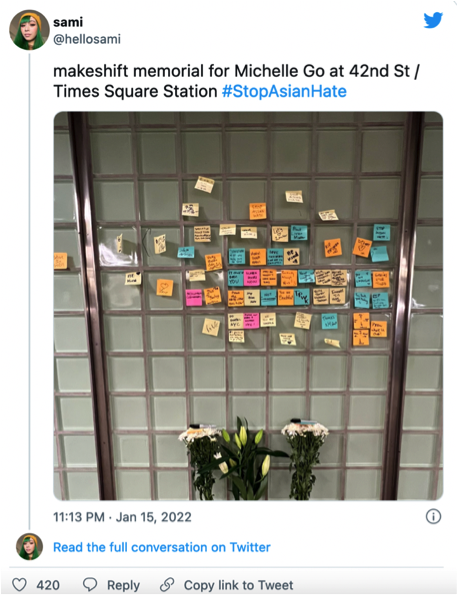
In 2022, I resolve to get more sleep, in order to wake up feeling optimistic, refreshed, and productive. Instead, I finish reading Melissa Febos’s memoir Girlhood, binge-watch last season’s Euphoria to feel freshly informed to watch season two. I often sleep by 2:30 a.m. when my eyes slip toward shadows, and I wake feeling groggy, unmotivated.
*
For anyone newly arrived to NYC, especially Times Square, there is sensory overload with the scent of street hot dogs in the air, reluctant actors dressed as Disney life-sized characters offering photos with tourists, the glow of shifting advertisements above. I imagine Michelle Go moving through this chaos, unblinking, having commuted countless times before. On the day she was killed, perhaps there was a muffled announcement on the loudspeaker, a dash to get to the R train, and then a thrust from behind, a sudden jolt of limbs into dark space, an intake of breath, and an inability to break brake the body from its fall.
I stop there. My mind cannot imagine the impact.
*
In the years since 2020, I try to feel the minutes passing as tangible objects, to hold a minute still but it wavers like a candle flame and moves out of reach. In a dream, I can sit inside the minutes, within a subway car. I can count time. The red digital display in the train flashes incremental facts, and I count from one stop to another, bored and impatient. The only place I can rest my gaze is my semblance in the train car window, which looks back at me with an expression I don’t recognize.
Michelle Go’s face is not my own. It is her own face or perhaps a likeness of her mother’s or her grandmother’s countenance.
Face of ancestors. A pride. A tribe.
*
Asian American Woman Pushed into Subway Tracks
Authorities Say it was Not Racially Motivated
Georgia Massage Parlor Shootings Leave 8 Dead
Authorities State it was Not Racially Motivated
I look up the meaning of authority:
- the confident quality of someone who knows a lot about something or who is respected or obeyed by other people
- a quality that makes something seem true or real
I research the etymology of authority:
From c. 1300 in the general sense “legal validity,” also “authoritative book; authoritative doctrine” (opposed to reason or experience); “author whose statements are regarded as correct.” From mid-14c. as “right to rule or command, power to enforce obedience, power or right to command or act.” In Middle English also “power derived from good reputation; power to convince people, capacity for inspiring trust.” From c. 1400 as “official sanction, authorization.” Meaning “persons in authority” is from 1610s; Authorities “those in charge, those with police powers” is recorded from mid-19c.
*
Info on Michelle Go is sparse, little to find. How do I find her?
What did she like? What did she study?
There is a good deal stated about her end. What about the beginning?
What marked that?
Did she have a birthmark? Did she ever fall off a bicycle?
Did she know how to drive?
*
Lately, I feel trapped as I have no way to transport myself in Upstate New York. I don’t know how to drive, and I failed my road test. It’s car reliant here, and the snow drifts in regularly, landing and dropping ten to twelve inches of snow. By morning, the hills are covered in a veil of white, which is both paradise and drudgery. To drive down the slope is treacherous, with my learner’s permit in the glove compartment. Walking to the car, I slip three times and once I fell with such force, I bruised both elbows, my shins, and ankle. I insist on driving.
Results of my second road test:
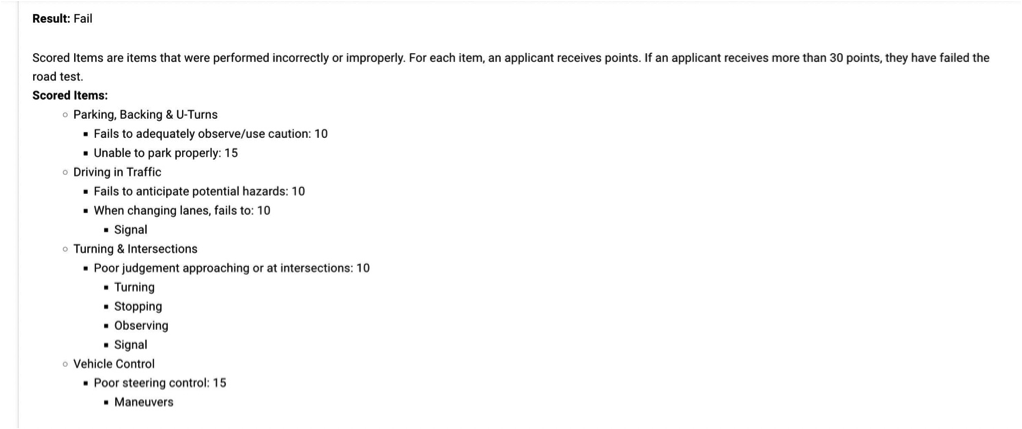
*
I wear the anticipation of fear like a charm around my neck. For many years, I actively rode trains during rush hour from Times Square when I worked as a temp, mostly as a receptionist. I was an envelope stuffer, typist, professional phone answerer, meeter/greeter, waitress, xerox machine jam specialist, and vessel for anyone who stopped by the front desk, asking me to listen to plans for vacation, an office dispute, strategies to stay/go/try for promotion.
Very few people were ever interested in my story. They often spoke, then left.
I listened carefully.
During the time I was a receptionist, I wrote poems.
Correction: One person befriended me. We sat in Midtown eating beneath the shadows of skyscrapers. I often had a brown bagged lunch. He often paid fourteen dollars for a salad. We made each other laugh easily. I thought he was my friend until he asked me out on a date. I didn’t accept, and we stopped having lunch. I continued on as a receptionist and eventually left to be a personal assistant because it meant I would be alone in an office. My friend confronted me for not liking him back and tried to kiss me one night after dinner. When I refused him, it was the first time I saw him angry and frustrated. Years later, he married a woman of Asian American descent.
*
Asian Americans are noteworthy to the media when they are:
- Excellent
- Spectacle
- Tragedy
*
When I lived in Brooklyn as a young woman, I was often followed home by men. Short men, tall men, heavyset men, thin men. Men of every race, background, and social economic influence. They cornered me as I fumbled for keys to my apartment building where I lived alone. Often, my race was a prime subject of their attraction. “I like Asian girls. You from China? Can you teach me Chinese?” a man exhaled as he tried to meet my gaze one late evening. I stayed quiet, plotting a way to enter my building without the threat of him rushing in behind me. I strategized my conversation, suppressing my disgust, and smiled as I lied and said my husband was waiting upstairs.
Over the years, each man’s reaction ranged from polite acquiescence to full-scale rants, spit-cursing before they turned from me. One man touched my face as if he believed he was my lover before he took leave.
I move inward, to safer rooms.
*
“Bitch!” They yelled.
In my twenties, I was called this name almost daily by men when I ignored their catcalls.
I thought [until most recently] perhaps my advanced age made me invisible to men.
Michelle Go celebrated her fortieth birthday. When she died, she was visible to someone.
*
As I write this, the headlines broadcast that Christina Yuna Lee, thirty-five, was followed into her NYC Chinatown apartment and stabbed to death on February 13, 2022. Police have not classified Lee’s death as a hate crime though all headlines stress that an Asian American woman was killed, instead of calling her first by her full name. Her race is announced, but authorities say her race was not visible to her assailant.
She was found at 4:30 a.m. in her bathtub. Her coworkers at Splice remember her as a magical person who made art. I can’t write anymore.
*
[]
[]
[]
*
Outside it snows. Subzero temperatures when the sparrows, finches, and cardinals astound me with their insistence, their fire streaking the graying sky. My dog returns home from a procedure drugged, tired, and confused. I stare at her abdomen when she is asleep. A long slit and sloppy black stitches mark her. She can no longer reproduce. I feed her snacks as if they were pain relievers. I sit with her longer than I need to, her white fur falling over my lap.
When each man called me a bitch, perhaps they thought the name passed through me like water. Most likely, they didn’t think of me at all. I was a target adorned with long hair, a fetish, until I rounded the corner, out of reach, disappearing.
I move between presence and absence. I have become good at it. A science. I can become invisible, except when I no longer can.
*
Dear Professor Chang:
I haven’t taken CW 200 but I’d like to take your 400 advanced writing class. I’ve been writing since I was a child.
Dear Professor Chang:
I am writing a research paper on Kendrik Lamar and I’d like to get your advice about lyricism in his work.
Dear Professor Chang:
We’d appreciate it if you can judge our local poetry contest. We ask that you review about 80-100 entries. Sadly, we don’t have the budget to pay you but we can invite you to our school to do a reading. We can provide bus fare but not a hotel room if you stay overnight.
*
At my previous teaching job, the president of the university looked on proudly and attempted to name all the faculty members present at the conference table. I dreaded this before the name game even began, predicting exactly what would happen: She confused me with the one other Asian American female professor in the room. She called me Cathy.
The director of the writing program often called me Suji, a writer with whom I shared an office for a year. When she made this mistake, she laughed awkwardly. Instead of confronting it, I alleviated her discomfort by saying the confusion happened all the time.
I feel motivated to side-eye.
I feel motivated to sigh.
I feel motivated to leave the room.
I feel motivated to move inward,
to safer rooms.
*
The single essential survival skill for anybody interested in creating art
is to learn to defend this inner life from the world. —Lan Samantha Chang
*
I often feel the most love for the world when I’m left alone. Isolation sets in. A flock of geese float by in a perfect V formation, the inner life takes on a vibrant violet hue. I feel a calming sensation as if I have swallowed a radiant pill. The sunset pulses inside my chest, and I close my eyes to imagine the last of daylight. I dissolve in a blaze.
*
The Phoenix was known to be a majestic bird-like creature that lived in Paradise. The Phoenix, like all other creatures who live in Paradise, was known to live a good life. It was a land of unimaginable perfection and beauty and was said to exist somewhere beyond the brilliance of the sun. However, in time, the bird began to feel the effects of its age. After one thousand years had passed, it was ready to move on.
First, the Phoenix flew west into the mortal world. It was necessary to come to leave Paradise… so that the creature could be reborn. It flew west until it reached the spice groves that grew in Arabia. It stopped there to collect only the finest herbs and spices before continuing its journey to Phoenicia. Once the Phoenix reached Phoenicia, it built a nest of the herbs and spices it had gathered and waited for the sun to rise.
After three days, a new Phoenix rose from the ashes and began the next cycle of one thousand years. It carried the remaining ashes of its parent to the great Heliopolis and returned to Paradise until its cycle came to an end.
*
Michelle Alyssa Go was a member of the Honor Society. She was a cheerleader, and she worked for a plumbing company and then a consulting firm. These are the few facts I found even after extensive research.
*
In New York City, I took the train everywhere. When it ran well, I could shoot from Bay Ridge to Union Square in ten minutes. I packed into the train, shoulder to shoulder, hip to hip, and sometimes groin to groin with the wrong person, holding my breath. One time, a man accidentally sneezed in my face. Before Covid, it was mere annoyance, but not a death sentence.
R Train Stops
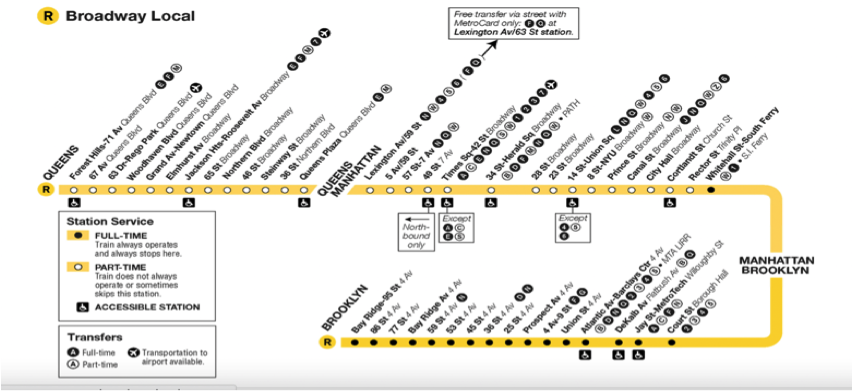
I enjoyed my freedom. Train life was the most unplanned theater production, the most volatile of educations. I was once grabbed in the long tunnels of the subway station. Just as a couple exited the station, a man grabbed me from behind. I threw my handbag on the ground, assuming he wanted money. He backed away, grinned, and watched me breathing hard. He never stopped smiling, even as he turned away, moving beyond my vision. By then, I could only hear his footsteps fading.
Michelle Go was about to step onto a Southbound R train. Maybe we glimpsed each other once. Her face and my face, our reflections unalike but turned in the same direction.
*
When I was younger, I was motivated to present projects on poster paper.
Glue, markers in bold letters, organized information in an easily digestible format.
I was a model student. I was a good girl.
I keep hearing the sound of birds when there are no birds.
The snow seems to have no direction but it has a force. The train moves through the tunnel.
The minutes have passed me by when the candle is snuffed out
in my dream. Winter moves on.
*
When I think of these women I keep safe from harm inside my notebook, the details of their true lives are unknowable to me, which feels like a heavy thud in the soles of my feet as I walk down a deserted road. The vigils, the protests, the interviews, and the work. It means something but in a forest, it does matter who is listening. Does it not?
It is winter, 2022, in what feels like the longest season of my life.
I write a poem, which is my only proof of what feels infinite but nothing is infinite so in writing it I’m realizing an end. I touch mortality when the tip of my finger taps a needle point:
Motivated
The power of silence is a music I’ve never listened to.
Music is a way of the mind to find the thorns
In a crown I place on my head.
If I take off this mask, I breathe a solace so deep
I destroy the trees, I set fire to the woods.
I walk alone amidst the smolder but free.
Sometimes in my dreams I come back to life.
My lungs fill with a knowledge of the century
which is a kind of funeral, fatal song as its end.
All year long I waited for the final breath that never came.
We kept ourselves busy: We played games, took turns,
Made bread, then broke the loaf in half
To see nothing inside but air.
And we were thankful for the world within us
That pulled us back with dazzling grief,
A prayer inside me that was a wish
To end my mourning by never dying.
I struggle to live. I carry time like earrings
Falling in chandeliers around me. I struggle
To hear myself knocking on the other side of the door.
And the year, in its infancy, crawls up and asks me
To hold it without crushing it.
To cradle its face, which marks me
With a trace resemblance.
My skin feels it and asks:
How much of this earth can hold you
Long enough before you ignite?
How much paradise can you bear?

